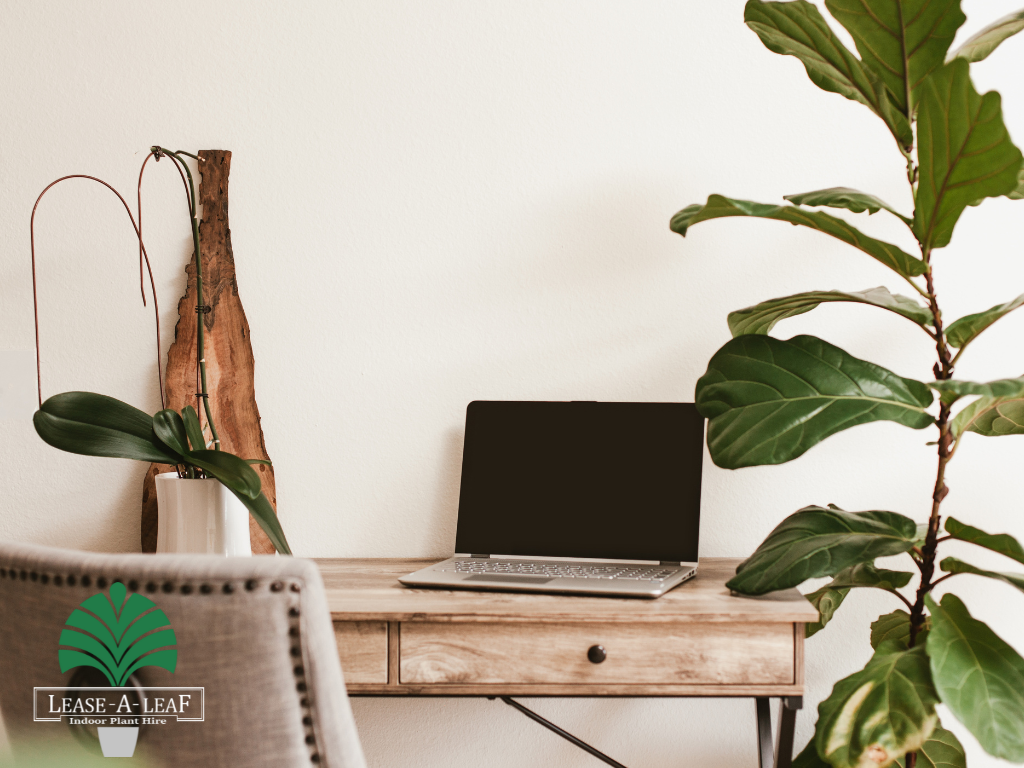The Psychological Benefits of Having Plants on Your Desk Their small stature allows them to fit conveniently on work desks, where they bring a touch of nature’s serenity to the often-mechanical office atmosphere.
It has been observed that these miniature green spaces are not merely aesthetically pleasing but also serve to enhance the quality of the workplace by contributing to a more vibrant and liveable office environment.
Impact of Plants on Mood and Well-being
The influence of plants on human mood has been substantiated through various scientific studies. It is reported that the presence of plants in a workspace can lead to enhanced emotional health among the workers. The sight and proximity of greenery have been linked with elevated feelings of happiness and a reduction in feelings of anxiety.
Investigations into the psychological effects of indoor plants consistently demonstrate a significant positive impact on mental well-being, suggesting that incorporating flora into office design is beneficial not only for the environment but also for the emotional state of the individuals within it.
Plants and Productivity
The connection between desktop plants and an increase in workplace productivity has been the subject of much scholarly attention. Research findings indicate that work environments that include plant life are associated with a non-negligible uptick in worker productivity.
Theories have been proposed to explain this phenomenon, with some suggesting that plants may improve cognitive function and others positing that the mere visual appeal of plants can enhance a person’s focus and efficiency. Regardless of the mechanism, the enhancement of work performance through the strategic placement of plants has been robustly supported by empirical evidence.
Plants Suitable for Desktops and Office Spaces

Spider Plant (Chlorophytum comosum)
Often praised for its air-purifying qualities, the Spider Plant is an excellent addition to any desktop, requiring minimal maintenance and capable of prospering in indirect sunlight.
Peace Lily (Spathiphyllum)
Recognized for its ability to flourish in low-light environments, the Peace Lily also boasts air-cleaning properties and presents a visually appealing aesthetic with its white blooms.
Zebra Plant (Haworthia fasciata)
This succulent is favored for its distinctive striped pattern and ease of care, requiring infrequent watering, making it a practical choice for busy office environments.
Jade Plant (Crassula ovata)
Known for its thick, lush leaves and tolerance for dry conditions, the Jade Plant is a symbol of prosperity and a popular choice for office spaces.
Stress Reduction and Plants
The role of plants in stress reduction has been thoroughly investigated in recent research. It has been found that the act of caring for plants, along with their presence, can significantly lower stress levels in individuals. Certain plants, such as lavender, jasmine, and aloe vera, have been specifically identified for their calming effects. The scents and visual appeal of these plants are often cited as factors that contribute to their ability to alleviate stress.
Effortless Green Thumb: Stress-Free Care Tips for Your Desktop Plants
To preserve the positive impact of desktop plants, certain maintenance routines are recommended. These routines are not only simple but also serve as brief, mindful breaks from screen time.
Regular Watering
Desktop plants typically require a consistent watering schedule. Overwatering or under-watering can be detrimental, so it’s essential to understand the needs of each species. [Set Watering Reminder]
Adequate Lighting
Ensuring that your plants receive the proper amount of light is crucial. For plants that thrive in indirect sunlight, positioning them near a window where they can receive filtered light is ideal. [Check Light Requirements]
Pruning and Cleaning
Removing dead or yellowing leaves helps to maintain the plant’s health and aesthetic appeal. Wiping the leaves with a damp cloth not only keeps the plant looking fresh but also maximizes its air-purifying capabilities. [View Pruning Guide]
Fertilization
Feeding your plants with the right fertilizer during their growing season can boost their vitality. This should be done sparingly, according to the specific needs of each plant. [Buy Plant Fertilizer]
Air Quality Improvement
The impact of plants on the improvement of indoor air quality has been well documented. Studies have highlighted that certain desktop plants possess air-purifying properties, capable of removing toxins from the environment.
Plants such as the spider plant, snake plant, and various species of ferns have been referenced in these studies for their effectiveness in cleansing the air, thus contributing to a healthier indoor climate.
Cognitive Function and Interaction with Plants
The connection between plants and enhanced cognitive performance has been explored in various academic works. It has been revealed that regular interaction with plants, even those as small as desktop varieties, can lead to improvements in memory, attention, and other cognitive functions.
The process of tending to a plant, as well as being in its presence during work, has been associated with these benefits, supporting the notion that plants are more than mere decorative items; they are active contributors to cognitive well-being.
Aesthetic Value and Its Psychological Impact
The visual appeal of plants has been recognized as a significant contributor to the creation of a positive workspace environment. The principles of design that incorporate the aesthetic integration of plants on desks have been studied, highlighting the enhancement of mood and productivity. It is emphasized that plants should be placed where they can be easily viewed to maximize their positive psychological effects.
Conclusion
In conclusion, the numerous psychological benefits of having desktop plants have been underscored throughout the discussion. It has been suggested that the incorporation of plants into workspaces serves not only aesthetic purposes but also promotes holistic well-being. The adoption of plants is thus encouraged for those seeking to enrich their work environment and enhance their overall work experience.

